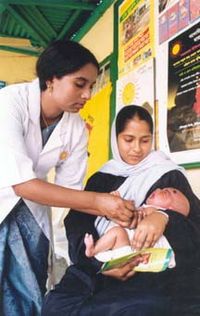
Photo from wikipedia
Abstract Objective: To test a culturally tailored obesity prevention intervention in low-income, minority preschool age children. Design: A three-group clustered randomised controlled trial. Setting: Twelve Head Start centres were randomly… Click to show full abstract
Abstract Objective: To test a culturally tailored obesity prevention intervention in low-income, minority preschool age children. Design: A three-group clustered randomised controlled trial. Setting: Twelve Head Start centres were randomly assigned to a centre-based intervention, a combined centre- and home-based intervention, or control using a 1:1:1 ratio. The centre-based intervention modified centre physical activity and nutrition policies, staff practices, and child behaviours, while the home-based intervention supported parents for obesity prevention at home. Study outcomes: The primary end point was change in children’s BMI (kg/m2) at post-test immediately following completion of the 8-month intervention. Secondary end points included standardised scores for BMI (BMIz) and body weight (WAZ), and BMI percentiles (BMI pctl). Participants: Three-year-old children enrolled in Head Start in San Antonio, Texas, with written parent consent (n 325), 87 % Latino, 57 % female with mean age (sd) of 3·58 years (0·29). Results: Change in BMI at post-test was 1·28 (0·97), 1·28 (0·87) and 1·41 (0·71) in the centre + home-based intervention, centre-based intervention and control, respectively. There was no significant difference in BMI change between centre + home-based intervention and control or centre-based intervention and control at post-test. BMIz (adjusted difference –0·12 (95 % CI, –0·24, 0·01), P = 0·06) and WAZ (adjusted difference, –0·09 (–0·17, –0·002), P = 0·04) were reduced for children in centre + home-based intervention compared with control group. Conclusions: There was no reduction in BMI at post-test in children who received the intervention. Findings shed light on methodological challenges in childhood obesity research and offer future directions to explore health equity-oriented obesity prevention.
Journal Title: Public Health Nutrition
Year Published: 2022
Link to full text (if available)
Share on Social Media: Sign Up to like & get
recommendations!